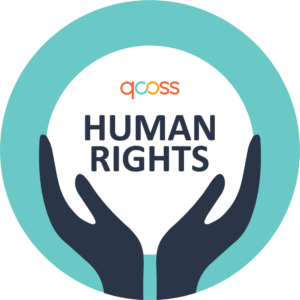Resources
Human Rights
Overview
Human rights are essential in a democratic and inclusive society that respects the rule of law.
Queensland’s Human Rights Act 2019, which came into effect on 1 January 2020, aims to protect and promote human rights, and to help build a culture in the Queensland public sector that respects and promotes human rights.

The Human Rights Act 2019 (Qld) intends to help promote a dialogue about the nature, meaning and scope of human rights.
The Queensland Human Rights Commission, formerly the Anti-Discrimination Commission Queensland, handles complaints and training on discrimination, vilification, victimisation and sexual harassment, under the Anti-Discrimination Act 1991.
What are human rights?
The Human Rights Act 2019 recognises that human rights must be exercised in a way that respects the human rights of others.
The Act allows rights to be limited, but only after careful consideration and only in a way that can be justified.
Queensland’s Human Rights Act 2019 protects 23 human rights.
The Act primarily protects civil and political rights drawn from the International Covenant on Civil and Political Rights. It also protects two rights drawn from the International Covenant on Economic, Social and Cultural Rights (right to education and health services) and on one right drawn from the Universal Declaration of Human Rights (property rights).
The Act explicitly recognises the special importance of human rights to the Aboriginal and Torres Strait Islander peoples of Queensland as Australia’s first people and their distinctive and diverse spiritual, material and economic relationship with the lands, territories, waters and coastal seas. It also recognises the particular significance of the right to self-determination to Aboriginal peoples and Torres Strait Islander peoples.
Find out more about Human rights law and download the Queensland’s Human Rights Act 2019 fact sheet.
Information for public entities
Public entities have obligations under the Human Rights Act 2019 to act and make decisions in a way that is compatible with human rights and to give human rights proper consideration when making decisions.
What is a public entity?
A public entity is an organisation or body providing services to the public on behalf of the government or another public entity. The public service and its employees are examples of public entities.
There are two types of public entities: core public entities and functional public entities (although these are not the terms used in the Act). Both have the same obligations under the Act.
Core public entities are public entities at all times, regardless of the functions they’re performing. State government departments fall under this category.
Functional public entities are those which are only public entities when they are performing certain functions. Including these under the Act reflects the modern operation of the government, where non-government entities are engaged in various ways to deliver services to the public, on behalf of the government or another public entity.
For the purposes of the Human Rights Act, a public entity is ‘in and for Queensland’. This means that federal public services and entities are not included.
Public entities with responsibilities under the Human Rights Act include:
- State Government departments and employees
- Local councils, councillors and employees
- Queensland police and other emergency services
- State schools
- Public health services
- Public service employees
- State Government Ministers
- Organisations providing public services on behalf of the government, e.g. public housing providers
To find out more about public entities and to download a toolkit go to the Human Rights Commission’s page on public entities.
What is not a public entity?
The Act defines a public entity as being ‘in and for Queensland’. This means that federal public services and entities are not included. Private schools are not public entities because they are not performing their services on behalf of the state. They do not have to comply with the obligations for public entities under the Act.
Many private hospitals and private healthcare providers will also be exempt, unless they are treating public patients.
The role and obligation of public entities
The Human Rights Act places two obligations on public entities: to give proper consideration to, and act compatibly with, human rights when making decisions or taking actions.
A public entity can act or make a decision that limits human rights, but only if it is reasonable and justifiable, or if the entity could not have acted differently or made a different decision because of another law.
Find out more about what is a public entity and acting compatibly with human rights for public entities on the Human Rights Commission website.
Acting and making decisions in accordance with human rights
The Human Rights Act 2019 places obligations on public entities to act and make decisions in accordance with human rights.
Under the Act, ‘compatible with human rights’ means an act or decision does not limit a human right or limits a human right only to the extent that is ‘reasonable and demonstrably justifiable’.
By understanding and considering human rights when delivering services or designing policy, public entities can play an important role in protecting the rights of everyone in Queensland.
Find out more about this on the Human Rights Commission web page on Acting and making decision in accordance with human rights.
Human rights resources library
QCOSS partnered with the Department of Treaty, Aboriginal and Torres Strait Islander Partnerships, Communities and the Arts (DTATSIPCA) and the housing and homelessness sector during 2021 to build understanding of the Act, increase confidence to work compatibly with the Act, and support the sector to use the Act for person-centred service delivery.
Informed by the work of the project, we’ve compiled this suite of handy resources on the Human Rights Act 2019 (Qld) to assist you to include human rights considerations in your every day policies, procedures and service delivery.
Training for the sector
Queensland’s Human Rights Act 2019 requires public entities to act compatibly with human rights when making a decision or acting. The Act protects 23 human rights in law.
Organisations contracted to provide services to the public on behalf of the Queensland Government are included under the Act as public entities and as such they need to make decisions and act compatibly with human rights.
This involves considering humans rights in a broad range of activities from administrative and human resource decisions, to policy, procedure and service delivery decisions. It also includes handling complaints that relate to human rights.
Assisting community centres to implement the Act
Community Legal Centres Queensland (CLCQ) is working on a community legal centres implementation project to assist community legal centres to be Human Rights Act ready, which includes the development of an implementation toolkit, factsheets, a webinar series and training. Access the resources.
Queensland Human Rights Commission
Human rights law – find here the Queensland’s Human Rights Act 2019 factsheet and the complaints process.
Training – the Commission is the leading authority on Queensland human rights and anti-discrimination law. It provide training courses, which can be tailored for each organisation’s needs, and online training for individuals.
Resources – Queensland Human Rights Commission provides posters, videos and toolkits to support organisations with the Human Rights Act 2019 (Qld).
Resources from across the sector
A curated set of sector resources from trusted sources.
Webinars and videos
Legal Aid Queensland
Queensland’s new Human Rights Act – What it means for your organisation and your clients (Recorded September 2019)
Guides, templates, articles and fact sheets
Queensland Government
General resources: Including forms, fact sheets, guides, templates and case studies.
Apply human rights to your work: Information on applying human rights to your work.
Queensland Human Rights Commission
Resources: The Act protects 23 human rights in law. This is your one-stop shop for a clear explanation of your rights and protections in Queensland.
Training
Queensland Government
Training materials: To help you apply the Human Rights Act 2019 (Qld) in your workplace.
Queensland Human Rights Commission
Training sessions: The Commission is the leading authority on Queensland human rights and anti-discrimination law. It provides training courses, which can be tailored for each organisation’s needs, and online training for individuals.

